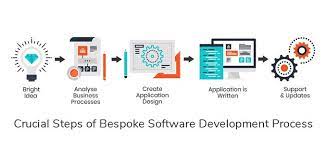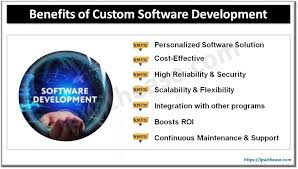Bespoke Development: Tailoring Solutions to Your Unique Needs
In today’s rapidly evolving digital landscape, businesses are constantly seeking innovative ways to stand out from the competition. Off-the-shelf software solutions may provide a quick fix, but they often fall short when it comes to meeting specific requirements and addressing unique challenges. This is where bespoke development comes into play.
Bespoke development refers to the creation of custom software or applications that are specifically designed to meet the unique needs of a business or organization. Unlike off-the-shelf solutions, bespoke development offers a tailored approach that aligns perfectly with your goals and objectives.
One of the key advantages of bespoke development is flexibility. With off-the-shelf software, you are often limited by what is available in the market. However, with bespoke development, you have complete control over the features, functionalities, and design elements of your solution. This allows you to create a product that not only meets your current requirements but also has the potential for future scalability and growth.
Another significant benefit of bespoke development is increased efficiency and productivity. By developing a solution that is specifically tailored to your business processes, you can streamline operations and eliminate unnecessary steps or bottlenecks. This can result in improved workflow, reduced manual effort, and ultimately higher productivity levels.
Moreover, bespoke development ensures enhanced security measures. Off-the-shelf software may be susceptible to vulnerabilities due to their widespread usage and known weaknesses. On the other hand, custom-built solutions can be reinforced with robust security features tailored to your specific needs. This provides an added layer of protection against potential cyber threats or data breaches.
Collaboration plays a crucial role in bespoke development. Throughout the entire process – from initial consultation to final implementation – developers work closely with clients to understand their unique requirements and goals. This collaborative approach ensures that every aspect of the solution aligns with your vision while incorporating expert advice and best practices from experienced professionals.
While it is true that bespoke development may require a greater investment of time and resources compared to off-the-shelf solutions, the long-term benefits far outweigh the initial costs. By investing in a custom-built solution, you are investing in the future success and growth of your business.
In conclusion, bespoke development offers a tailored approach to software solutions, providing businesses with the flexibility, efficiency, security, and collaborative experience they need to thrive in today’s competitive market. By opting for custom-built solutions, you can unlock endless possibilities and ensure that your business stands out from the crowd. Embrace bespoke development and embark on a journey towards innovation and success.
Frequently Asked Questions about Bespoke Development: Answers to Your Queries
- What is bespoke development?
- How much does bespoke development cost?
- What are the benefits of bespoke development?
- How long does it take to develop a custom solution?
- What are the risks associated with bespoke development?
- How can I find a reliable developer for my project?
What is bespoke development?
Bespoke development refers to the process of creating custom software or applications that are specifically designed and built to meet the unique needs and requirements of a particular business or organization. Unlike off-the-shelf software solutions, which are pre-packaged and available to a wide range of users, bespoke development involves tailoring a solution from scratch to address specific challenges, workflows, and goals.
In bespoke development, a team of experienced developers and designers work closely with the client to understand their specific requirements and objectives. This collaborative approach allows for the creation of a customized solution that aligns perfectly with the client’s vision and business processes.
The key advantage of bespoke development is its ability to provide highly personalized solutions. Off-the-shelf software may offer generic features that cater to a broad user base, but they often lack the flexibility to address unique business needs. With bespoke development, every aspect of the software can be tailored precisely to match the client’s requirements, including functionalities, user interface design, integration with existing systems, scalability options, and security measures.
Bespoke development also allows for greater control over the development process. The client has direct input into every stage of development, from initial planning and design to testing and implementation. This ensures that the final product meets their expectations in terms of functionality, performance, usability, and overall user experience.
While bespoke development offers numerous benefits in terms of customization and control, it is important to note that it typically requires more time and resources compared to off-the-shelf solutions. The development process involves thorough analysis, planning, coding, testing, and ongoing support. However, this investment is often justified by the long-term advantages gained through having a tailored solution that perfectly fits the unique needs of the business.
In summary, bespoke development is about creating custom software or applications that are tailor-made for a specific business or organization. It offers flexibility, personalization, control over features and design elements while addressing unique challenges. By opting for bespoke development, businesses can achieve a higher level of efficiency, productivity, and competitive advantage in their respective industries.
How much does bespoke development cost?
The cost of bespoke development can vary significantly depending on various factors. It is important to note that each project is unique, and the pricing will be influenced by the complexity, scope, and specific requirements of the development.
Some of the factors that can impact the cost of bespoke development include:
- Project Complexity: The complexity of the project plays a significant role in determining the cost. Projects with intricate functionalities, complex integrations, or advanced features may require more time and resources, resulting in higher costs.
- Development Timeframe: The timeframe for completing the project can affect the cost. Urgent or expedited projects may require additional resources to meet tight deadlines, which can result in higher costs.
- Customization Requirements: The level of customization needed for your solution will also impact the cost. Extensive customization or unique features that require specialized development work may increase the overall price.
- Integrations: If your bespoke solution needs to integrate with existing systems or third-party services, it may involve additional development efforts and costs.
- Maintenance and Support: Consideration should be given to ongoing maintenance and support costs after the development phase is complete. This includes bug fixes, updates, and technical support.
It’s worth noting that while bespoke development may have higher upfront costs compared to off-the-shelf solutions, it offers long-term benefits tailored specifically to your business needs.
To get an accurate estimate for your bespoke development project, it is recommended to consult with professional developers or agencies who can assess your requirements and provide a detailed proposal outlining scope, timeline, and cost breakdown specific to your project.
Remember that investing in quality bespoke development can yield substantial returns by providing you with a unique solution that aligns perfectly with your business goals and requirements.
What are the benefits of bespoke development?
Bespoke development, also known as custom development, offers a range of benefits that can greatly impact businesses and organizations. Here are some key advantages of opting for bespoke development:
- Tailored to Your Needs: The most significant benefit of bespoke development is the ability to create a solution that perfectly aligns with your specific requirements. Off-the-shelf software may not address all your unique challenges or offer the desired features. With bespoke development, you have complete control over the design, functionalities, and features of the solution, ensuring it caters to your exact needs.
- Flexibility and Scalability: Custom-built solutions provide flexibility and scalability that off-the-shelf software often lacks. As your business evolves and grows, your software should be able to adapt accordingly. Bespoke development allows for future scalability, enabling you to add or modify features as needed without being limited by pre-existing constraints.
- Increased Efficiency and Productivity: By tailoring a solution to fit your business processes, bespoke development can streamline operations and eliminate unnecessary steps or manual effort. This leads to improved workflow efficiency and increased productivity levels within your organization.
- Enhanced Security Measures: Off-the-shelf software is widely used, making it an attractive target for cyber threats. Bespoke development allows for customized security measures designed specifically for your solution’s needs. This ensures better protection against potential vulnerabilities or data breaches.
- Competitive Advantage: Custom-built solutions provide a unique competitive advantage by differentiating your business from competitors who rely on generic software. Bespoke development enables you to create a solution that reflects your brand identity, values, and specific market requirements – giving you an edge in the industry.
- Long-term Cost-effectiveness: While bespoke development may require a higher initial investment compared to off-the-shelf solutions, it can prove more cost-effective in the long run. Custom-built solutions eliminate ongoing licensing fees associated with commercial software packages while reducing the need for additional software or integrations to address specific needs.
- Collaborative Approach: Bespoke development involves close collaboration between developers and clients. Throughout the development process, you have the opportunity to provide feedback, make adjustments, and ensure that the final solution meets your expectations. This collaborative approach results in a product that truly reflects your vision and incorporates expert advice from experienced professionals.
In summary, bespoke development offers tailored solutions that address your unique needs, provide flexibility and scalability, enhance efficiency and security, offer a competitive advantage, and promote long-term cost-effectiveness. By investing in custom-built software solutions, businesses can unlock their full potential and achieve greater success in their respective industries.
How long does it take to develop a custom solution?
The time it takes to develop a custom solution can vary depending on several factors. The complexity of the project, the scope of the requirements, and the availability of resources all play a role in determining the development timeline.
Smaller projects with relatively straightforward requirements may take a few weeks to complete, while larger and more complex projects can take several months or even longer. It’s important to note that custom development involves various stages such as planning, design, development, testing, and deployment. Each stage requires time for thorough analysis, implementation, and quality assurance.
The involvement of stakeholders also affects the timeline. Regular communication and feedback loops between clients and developers are essential for ensuring that the solution meets expectations. Delays in decision-making or changes in requirements can impact the overall development time.
To get a more accurate estimate for your specific project, it is advisable to consult with experienced developers or development companies. They can assess your requirements in detail and provide you with a timeframe based on their expertise and experience.
Remember that rushing through the development process may compromise quality and result in an incomplete or unsatisfactory solution. It’s crucial to strike a balance between efficiency and delivering a robust custom solution that meets your unique needs.
What are the risks associated with bespoke development?
While bespoke development offers numerous advantages, it’s important to be aware of the potential risks involved. Here are a few considerations:
- Cost: Custom-built solutions can be more expensive than off-the-shelf options. The development process requires skilled professionals, extensive planning, and thorough testing, which can increase the overall project cost. Additionally, ongoing maintenance and updates may also incur additional expenses.
- Time: Bespoke development typically takes longer than implementing an off-the-shelf solution. The development process involves gathering requirements, designing, coding, testing, and implementation – all of which require time and coordination. Delays in any of these stages can impact project timelines.
- Technical Complexity: Developing a custom solution from scratch involves dealing with technical complexities. This includes ensuring compatibility with existing systems or infrastructure, integrating with third-party software or APIs, and addressing potential scalability issues. These complexities may pose challenges during the development process.
- Expertise and Resources: Bespoke development requires a team of skilled professionals who possess expertise in various technologies and programming languages. Finding the right talent and assembling a capable team can be challenging and time-consuming.
- Limited Vendor Support: Unlike off-the-shelf solutions that often come with dedicated support teams or forums for assistance, bespoke solutions rely on the expertise of the development team or external vendors hired for support. Therefore, it is crucial to establish clear communication channels and service level agreements to ensure timely support when needed.
- Dependency on Development Team: When opting for bespoke development, you become reliant on the developers who created your solution for ongoing maintenance and updates. If they are no longer available or if there is a breakdown in communication or relationship, it could lead to challenges in maintaining or enhancing your custom solution.
- Compatibility Issues: As technology evolves rapidly, compatibility issues may arise when integrating custom-built solutions with new systems or software updates in the future. Regular monitoring and proactive measures are necessary to address these compatibility challenges.
To mitigate these risks, it is essential to conduct thorough research, choose a reputable development partner, and clearly define project scope, requirements, and expectations. Regular communication, proper documentation, and a well-defined contract can help ensure a smooth development process and ongoing support.
Ultimately, while bespoke development carries certain risks, with proper planning and collaboration with experienced professionals, these risks can be minimized, and the benefits of a tailored solution can be fully realized.
How can I find a reliable developer for my project?
Finding a reliable developer for your project is crucial to ensuring its success. Here are some steps you can take to find a reliable developer:
- Define your project requirements: Before you start searching for a developer, clearly define your project requirements, including the scope, timeline, and budget. This will help you communicate your needs effectively and evaluate potential developers more accurately.
- Seek recommendations: Reach out to your professional network, colleagues, or friends who may have worked with developers in the past. Personal recommendations can provide valuable insights into the reliability and quality of their work.
- Research online platforms: Explore reputable online platforms that connect clients with developers, such as freelance marketplaces or developer communities. Read reviews, check portfolios, and assess ratings to get an idea of their previous work and client satisfaction levels.
- Review portfolios and experience: Look for developers who have relevant experience in your industry or niche. Review their portfolios to see if they have successfully completed projects similar to yours. Pay attention to the quality of their work, attention to detail, and overall design aesthetics.
- Evaluate technical skills: Assess the technical skills of potential developers by reviewing their previous projects or asking them to complete a small test task related to your project. This will give you an idea of their proficiency in the required programming languages or frameworks.
- Check references: Request references from shortlisted candidates and reach out to their previous clients or employers for feedback on their reliability, communication skills, adherence to deadlines, and overall professionalism.
- Conduct interviews: Schedule interviews with potential developers to discuss your project in detail. Use this opportunity to assess their communication skills, problem-solving abilities, and compatibility with your team or company culture.
- Consider communication and availability: Communication is crucial throughout the development process. Ensure that the developer is responsive and communicates clearly and effectively. Discuss availability expectations upfront so that there are no conflicts later on.
- Discuss pricing and contracts: Clearly discuss pricing structures, payment terms, and any other contractual agreements before finalizing the collaboration. Make sure you have a written contract that outlines project deliverables, timelines, milestones, and any other relevant details.
- Start with a small project: If you are unsure about a developer’s reliability or compatibility, consider starting with a smaller project to test their skills and work ethic before committing to a larger project.
Remember, finding a reliable developer is not just about technical skills but also about their ability to understand your vision, meet deadlines, and communicate effectively. Take your time during the selection process to ensure you find the right developer who aligns with your project requirements and goals.




